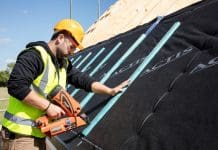This article from Build Warranty explores how to gain structural warranty for a property, and the benefits of a self-building warranty
There is a great deal of confusion amongst self-builders concerning the concept of a self-building warranty, such as what are they and how you could benefit from one?
What is a self-build warranty?
Building a custom home should be a dream come true; however, with every build comes elements of risk and disruption of your self-build.
The self-build structural warranty or latent defects insurance policy guarantees the structural integrity of your building against building defects that may occur during the build design or materials used in the construction process.
The warranty provider will check your plans, known as a technical audit and carry out an inspection process at various stages of the build, and on completion, a 10-year warranty is provided for housebuilders to ensure that any defects discovered in each period during the agreement will be covered if they lie within the builder’s responsibility.
This reduces the number of inspectors on site, making it an efficient proposition. A structural warranty protects the future homeowner against risks that are not covered elsewhere and will be a requirement of most lenders.
What is the typical cost of a self-build warranty?
Typically, the warranty cost is primarily based on the size of the new build, the frame construction type, and the build cost. The average price is between £1,000 and £4000.
The average cost for a warranty is £2,000. This covers the full premium for 10 years, including all technical site audit visits by a professional surveyor
What does a structural warranty cover?
The policies are designed to cover latent defects in the design, workmanship or materials which arise during construction, renovation or conversion but are not discovered until after completion of the structure of the building at the project address.
When comparing a warranty with home insurance, the main obvious distinction is that home insurance will protect you against issues that are indifferent to the structure of your build.
What is the defects period and the structural insurance period?
A self-build warranty typically consists of two periods: the defects period and the structural insurance period.
The defects period, which starts when the building receives its certificate of completion, covers any issues that may arise during the first two years of the policy. During this time, the contractors are responsible for amending any defects.
The structural insurance period, which covers the 3rd to 10th year of the contract, is when the insurer is responsible for the cost of any structural defects. This usually includes load-bearing foundations, roof coverings, load-bearing walls, partitions, floors and staircases, roof framing systems, load-bearing lintels and chimneys and flues.
Other benefits that could be included in a policyholder’s coverage include contaminated land remediation expenses incurred to comply with a statutory notice, expenses for repairs needed when there is a danger to the physical health and safety of occupants due to non-compliance with building regulations, and deposit protection, should contractors go out of business during the build, the self-builder deposit will be protected.
Who needs a self-build structural warranty?
While there is no legal requirement for self-builders to take out a 10-year warranty on their new homes, most lenders will require it to grant a loan. This is because the Council of Mortgage Lenders and other high-street lenders accept this type of coverage.
There are alternatives to taking out a self-build warranty, such as an architect’s certificate. This is a signed statement which confirms that the build has been supervised and constructed in line with building practices. It may be cheaper than a warranty, but it usually only covers six years and is not an underwritten insurance policy.
What are the benefits of a self-build warranty?
One of the most obvious benefits is that a structural warranty gives you the peace of mind of knowing that you are covered in case something goes wrong, saving you time and money. The provider will also conduct regular inspections to ensure that the building meets all relevant building standards.
Also, as mentioned earlier, most mortgage lenders may ask not to lend money to a self-builder without a self-build warranty, so having a policy in place, especially if you are looking to sell the built property in the future. Having a self-build policy is worth the investment.
Where can you get a self-build warranty?
The ideal time to start thinking about getting a structural warranty is when the homebuilder is about the entail the project. The reasons for this; to ensure that your building is acceptable to warranty providers, can factor the costing of the warranty into the project budget, and deciding to leave the decision of purchasing a warranty, could have a higher price, as the surveyors will not have had a full visibility of the build process.
It is important to remember that self-builder may think that the project may meet all the building regulations, and nothing may go wrong, unfortunately that may not always be the case. Professionals like surveyors, architects and builders can make mistakes, there can be faults with the building materials or issues with the land of the self-build that will be constructed on. A self-build warranty covers you against all these risks.
Here at Building Warranty, we specialise in all kinds of structural warranties, providing protection for homeowners to developers; we are the UK’s number one choice for warranty solutions, professional advice, and personal service.
If you would like more information about our self-build warranty and how it could protect your build, we can guide you with the right advice.
Give us a call on 0800 5200155 to speak to one of our professional team members, or email your enquiries to us at info@buildwarranty.co.uk, and one of our self-build warranty team members will get back to you as soon as we can.
Alternatively, you can complete a simple online form, and one of our team specialists will process your quote immediately.











![[VIDEO] Making DorTrak reports easy to read with Fireco Inspecting fire doors at Fireco, firedoor technology, 2023](https://www.pbctoday.co.uk/news/wp-content/uploads/2024/04/JPZ_2364-web-218x150.jpg)
![[VIDEO] Re-flow Field Management review by Traffic Management Installations When TMI began subcontracting for councils and government bodies, they wanted to present their site reporting in a more professional manner](https://www.pbctoday.co.uk/news/wp-content/uploads/2025/03/TMI-Media-1-218x150.png)

